Pontevedra on the Camino (Activities, Accommodations + More)
Are you planning to hike the Camino Portugués and wondering what to do in Pontevedra? This historic city is one of the true highlights of the Portuguese Way—and the last thing you want is to breeze by without soaking it in.
I visited Pontevedra twice when I walked the Camino Portugués Central route followed by the Coastal route in May 2025. Both times, it stood out as a favorite.
And honestly? I wish I’d done more research ahead of time. There’s so much more to see there than most pilgrims expect.
If it’s your first time walking the Camino Portugués, consider this your go-to guide for making the most of your stop in Pontevedra.
Keep reading to find out everything you need to know for your Pontevedra Camino de Santiago stop, including the city's history, top things to do when you have limited time, and the best places to stay (including a 16th-century palace!)

History of Pontevedra
Pontevedra has a rich history, and much of its history can still be felt walking around the city today. In fact, it has the second most important historical center in Galicia after Santiago de Compostela.
Leaving town on the Camino, pilgrims cross the river via the Burgo Bridge built by Romans hundreds of years ago. This bridge, previously referred to as “Pons Vetus” (meaning “old bridge”), is where the city's name Pontevedra comes from.
Long an important maritime and trading city, it's likely that Christopher Columbus's ship Santa Maria was built in Pontevedra.

Significance of the City to the Camino
Historically Pontevedra has long been tied to the Camino. Throughout the city, you can find Camino imagery in buildings and monuments that are centuries old.
The Portuguese Way originally formed in the Middle Ages due to old Roman roads throughout the region. These routes started to grow in popularity after Queen Isabella of Portugal made the journey herself in the 14th century.
Nowadays, Pontevedra continues to be a city of importance on this Camino. Some even call it the capital of the Portuguese Way.
Unlike the Camino Francés, the Camino Portugués has many different routes pilgrims can take. Pontevedra is special along the route because it's one of the few places all pilgrims on the Portuguese Way pass through.
Shortly before Pontevedra, the Coastal route of the Portuguese Way joins the Central route. Shortly after, there's a split where some pilgrims choose to take the Spiritual Variant (more on that below), but most continue on via the Central route.

Top Things to Do in Pontevedra
Pontevedra has so many things to do that it could honestly merit a rest day if you have the time and desire to stop and see more. If you're only there for a night though, here are some of the top attractions in Pontevedra to consider.
Attend Pilgrim's Mass
Igrexa da Virxe Peregrina offers pilgrim's mass daily at 7:30 p.m. except on Sundays when it's at 1 p.m.
As Spain's only circular church, it's a unique place to visit. It's actually designed in the shape of a Camino scallop shell!
I visited for pilgrim's mass myself the first time I passed through the city and really enjoyed it. This is one of the few places on the Portuguese Way where you can experience pilgrim's mass.
Visit the Basílica de Santa María a Maior
This church was built mostly throughout the 16th century. In 1962 Pope John Paul II gave the church the title of basilica, making it the most notable religious building in the city.
Admission is free, but if you want to go up in the tower, you have to pay €1. It's open daily and on public holidays from 10 a.m. to 2 p.m. and 5 to 9 p.m.
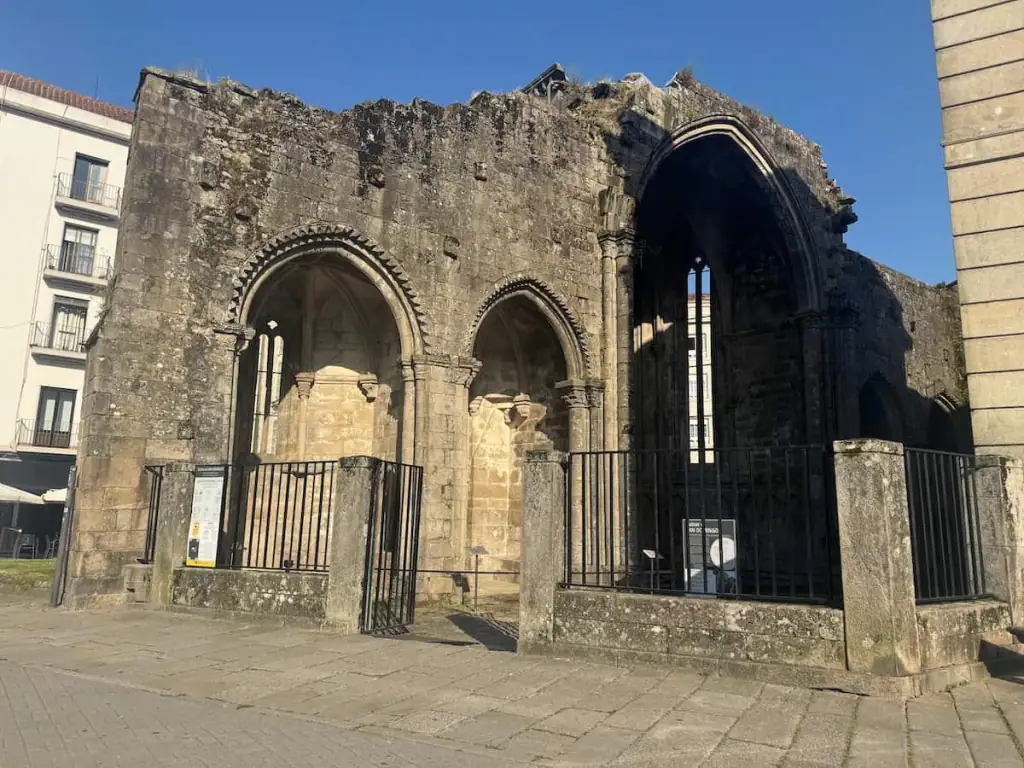
See the Ruínas de San Domingos
These ruins are the only remains of a church complex from the 14th-15th century. They're now part of the Museum of Pontevedra.
Much of the ceiling is gone, and it's cool to see this old stone Gothic architecture that's been left out in the elements. There isn't loads to see, but it's a cool spot to visit for 10 minutes or so.
I stumbled upon this during my last visit to the city while hiking the Coastal route of the Portuguese Way. I particularly found it interesting to see some old coats of arms carved into the stone.
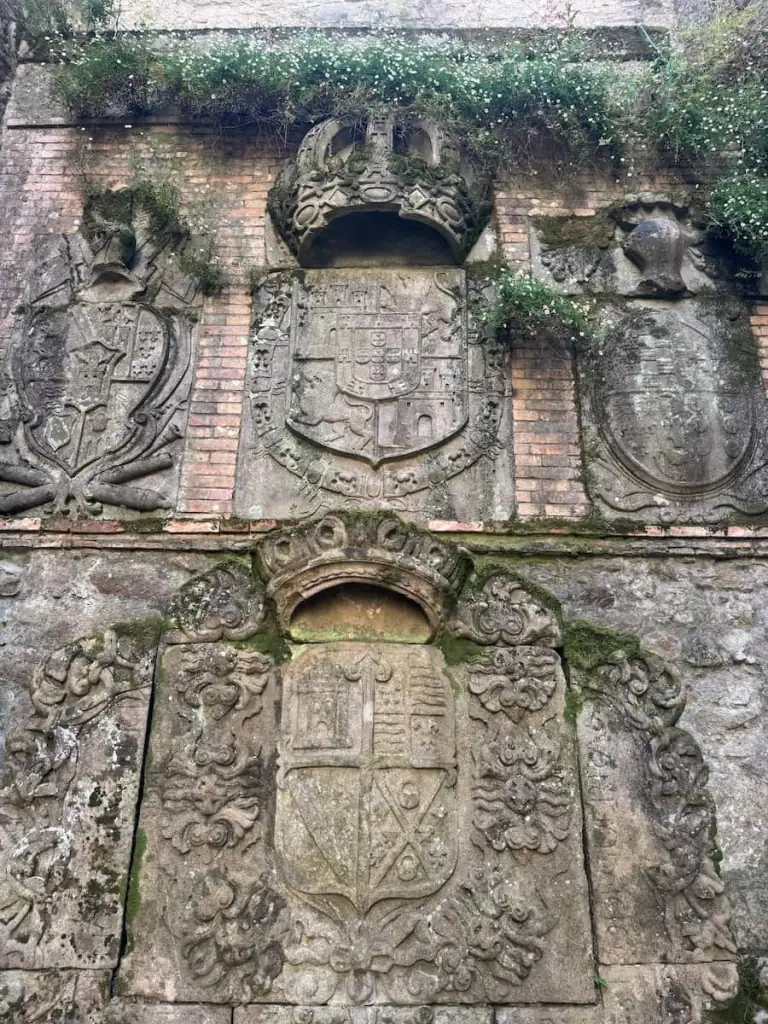
Visiting the ruins is free and open from March 15 to October 31. Hours are as follows:
- Tuesday through Saturday: 10 a.m. to 2 p.m. and 4 to 7:30 p.m.
- Sundays/public holidays: 11 a.m. to 2 p.m.
- Mondays: closed
Check Out the Convento e Igrexa de San Francisco
Legend says the Convento e Igrexa de San Francisco was built by the wish of Saint Francis of Assisi who passed through on his Camino. It was built during the 14th century and has spectacular vaulted ceilings and peaceful gardens.
Hours for the convent are unclear, but even if you miss when it's open, the outside is lovely to visit.
Connect with Other Women Hiking the Camino
Join my free Facebook group! We're building up a community of women who have hiked or are planning to hike the Camino there. You can also get personalized support from me!
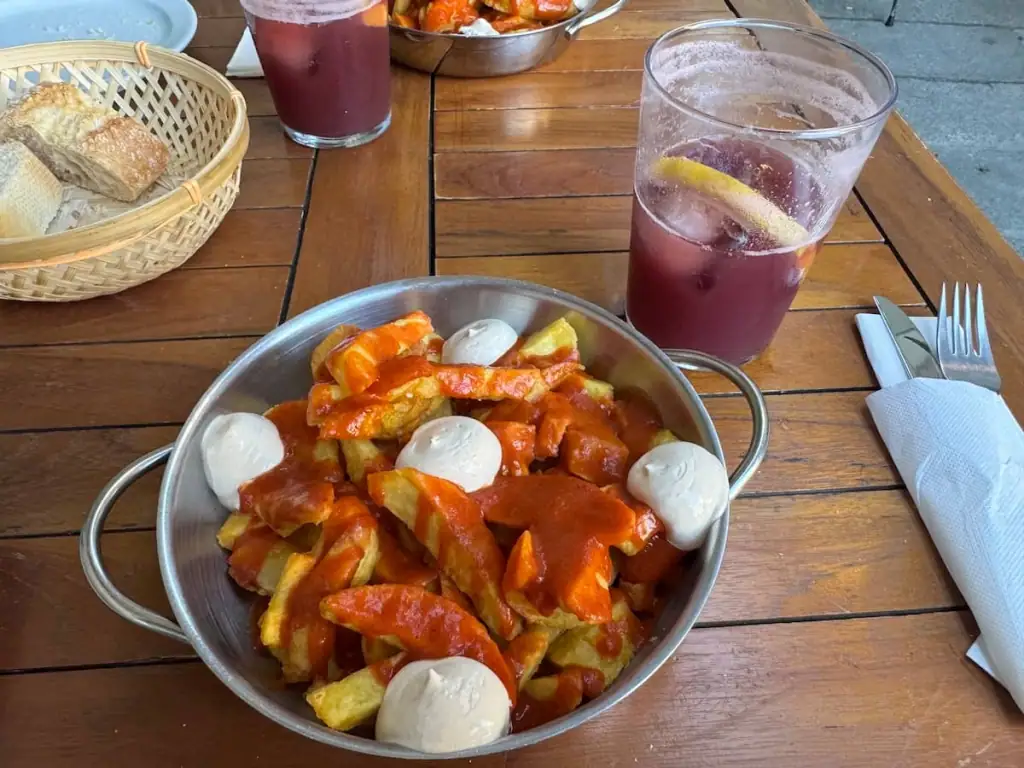
Where to Eat in Pontevedra
Pontevedra has a number of great places to eat. Here are some I recommend:
- Kamelia Taberna has good Spanish tapas and views of the church. The night I visited, the kitchen opened at 7 p.m., so it seems to open a little earlier than the typical Spanish meal time.
- Trasmallo is one of the highest-rated restaurants in the city. It's recognized in the Michelin guide for its contemporary cuisine but has reasonable prices. Popular dishes include their croquetas, fish of the day, and baked cheesecake.
- Loaira Xantar is another Michelin-recognized restaurant with regionally-inspired dishes.
- Rincón de Bocalino isn't necessarily anything special, but if you're looking for cheap and quick pizza by the slice at any time of day, come here. There's nowhere to sit inside, but there's a nice nearby park where you can sit on a bench and eat. I got food here after walking a long ways and being too tired for anything else.
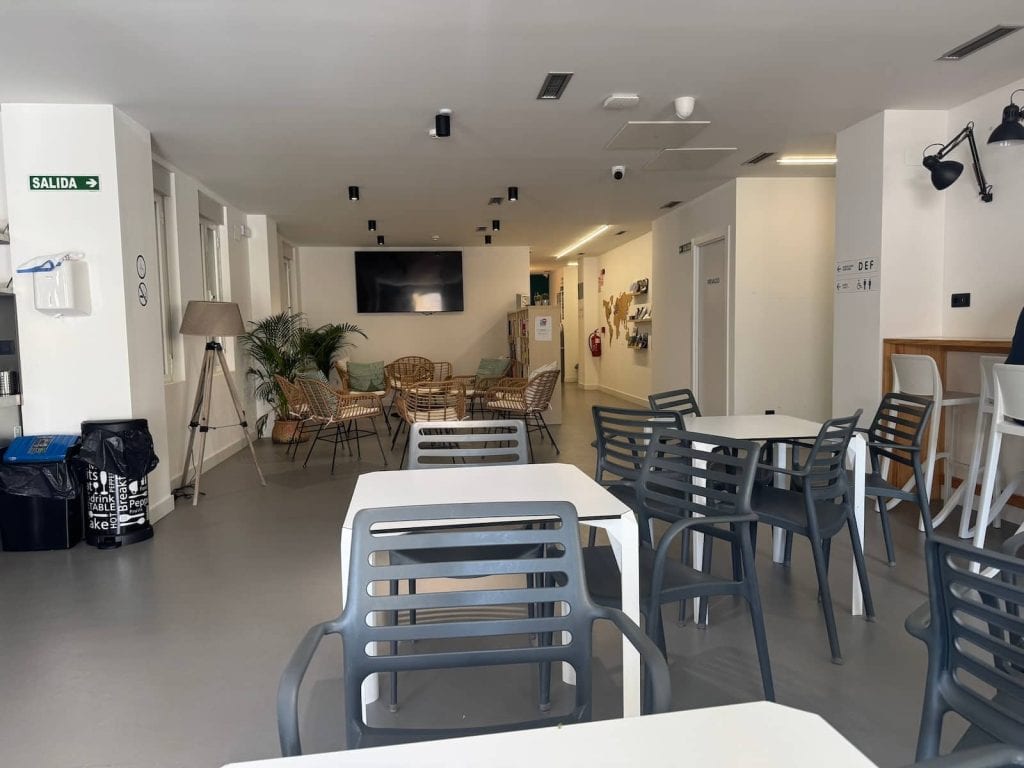
Accommodations in Pontevedra for the Camino de Santiago
Wondering where to stay in Pontevedra? Here are a few places at various price points that I recommend:
📍Budget Option: Bulezen Urban Hostel is a very nice private albergue with shared rooms right in the center of the city. Beds have curtains and there's a nice kitchen and outdoor terrace. I stayed here both times I was in Pontevedra and recommend it.
📍Mid-Range Option: Hostel Charino is a highly rated private albergue with both private rooms and shared rooms.
📍Luxury Option: Stay in an 16th century Renaissance palace at the Parador Hotel. Anytime you can fit a Parador into your budget, I highly recommend it. They're known as some of the nicest hotels in Spain and the ones that fall on the Camino tend to be fairly affordable for the luxury experience they offer.
I’ve written an article on my favorite albergues on the Camino Portugués, so check that out for more guidance on where to stay during your journey!
Pontevedra Camino Map
This map shows the ways you can get to Santiago de Compostela from Pontevedra. Typically people take 3-4 days to walk to Santiago de Compostela from Pontevedra.
As you can see, there are two ways to get to Santiago de Compostela from Pontevedra. You can either continue along the traditional Central route (in blue), which is the way most pilgrims go, or you can take the Spiritual Variant (in red).
I personally hiked both ways from Pontevedra. While both have nice scenery, I preferred the Spiritual Variant.
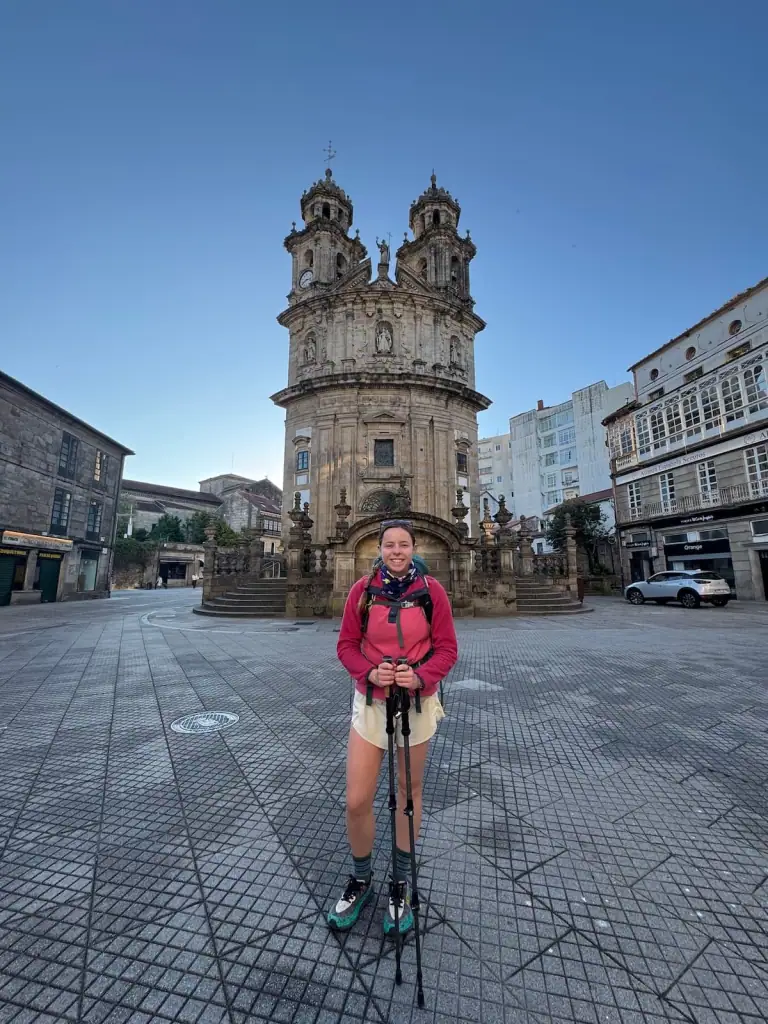
Pontevedra to Santiago de Compostela Camino Stages
As you think about where you want to stop on the way from Pontevedra to Santiago de Compostela, here are some walking stages to consider. I walked these exact stages myself in May 2025.
Note: If you want to get a Compostela certificate for finishing your Camino, you cannot start in Pontevedra as it does not meet the distance requirements. The closest points to Santiago where you could start would be O Porriño on the Central route or Vigo on the Coastal route.
Via the Central route: Most pilgrims take this route to Santiago de Compostela.
- Pontevedra to Caldas de Reis: 13.0 miles (21.0 km)
- Caldas de Reis to A Escravitude: 15.2 miles (24.5 km)
- A Escravitude to Santiago de Compostela: 11.1 miles (17.8 km)
➡️ Click here for more details on recommended walking stages on the Central route.
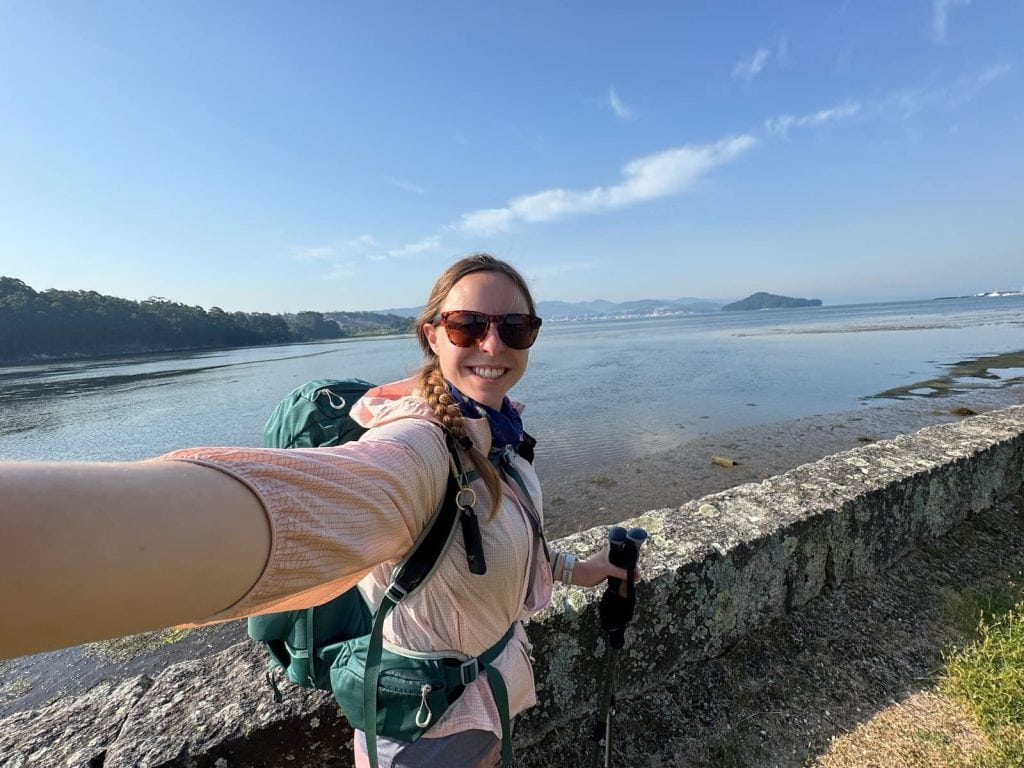
Via the Spiritual Variant: Fewer pilgrims take this route that provides a detour between Pontevedra and Pontecesures (just south of Padrón). It allows you to take the same path as Saint James's remains allegedly took on their way back into Galicia.
- Pontevedra to Armenteira: 12.7 miles (20.5 km)
- Armenteira to Vilanova de Arousa: 14.7 miles (23.7 km)
- Vilanova de Arousa to O Milladoiro: 12.7 miles (20.5 km) + a boat ride
- O Milladoiro to Santiago de Compostela: 4.2 miles (6.7 km)
➡️ Click here for more details on this detour that follows the path of Saint James.
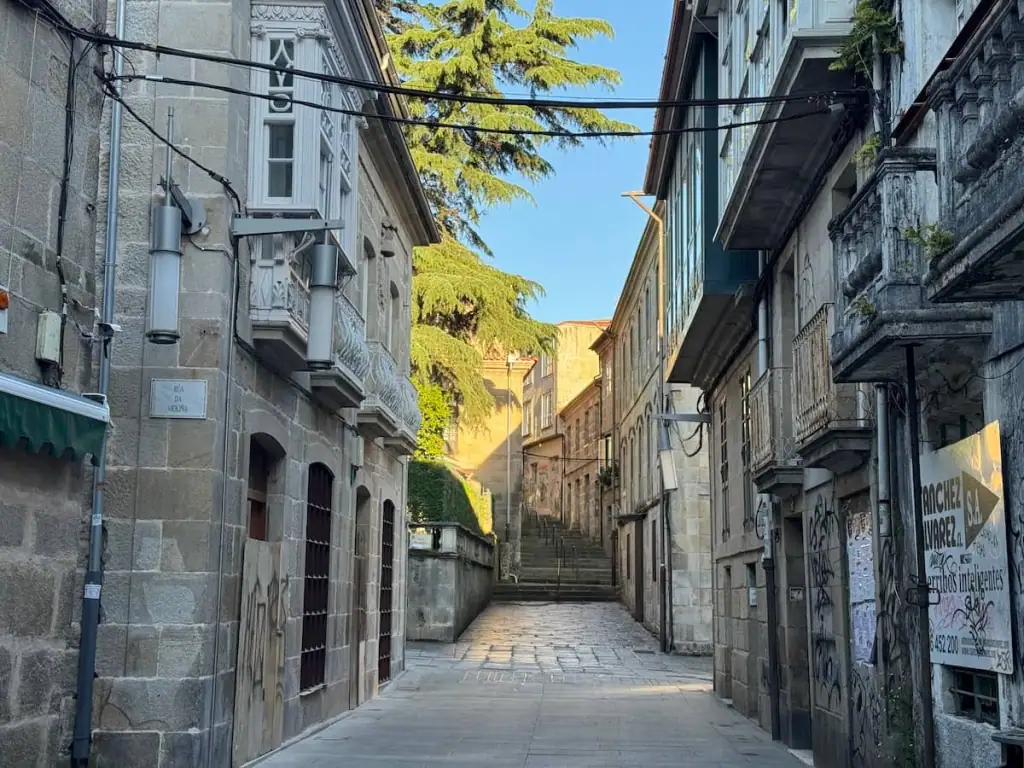
Frequently Asked Questions
Here are some answers to frequently asked questions when it comes to visiting Pontevedra on the Camino de Santiago.
Is Pontevedra on the Camino?
Yes, Pontevedra, Spain sits along the Camino Portugués Central route of the Camino de Santiago. It's one of the few stops on the Portuguese Way that all pilgrims pass through since it's on the stretch after the Central and Coastal Camino join and before the Spiritual Variant splits.
Is Pontevedra worth visiting?
Pontevedra is worth visiting. It's has the second most important historical center in Galicia. The city's old town feels like stepping back in time, and the food there is incredible too.
What is there to do in Pontevedra?
There are numerous things to do in Pontevedra, so much so that you could spend a couple days there if you really wanted to. Check out the unique Igrexa da Virxe Peregrina church shaped like a scallop shell, see the old Ruínas de San Domingos church ruins, and visit other notable religious sites in the city.
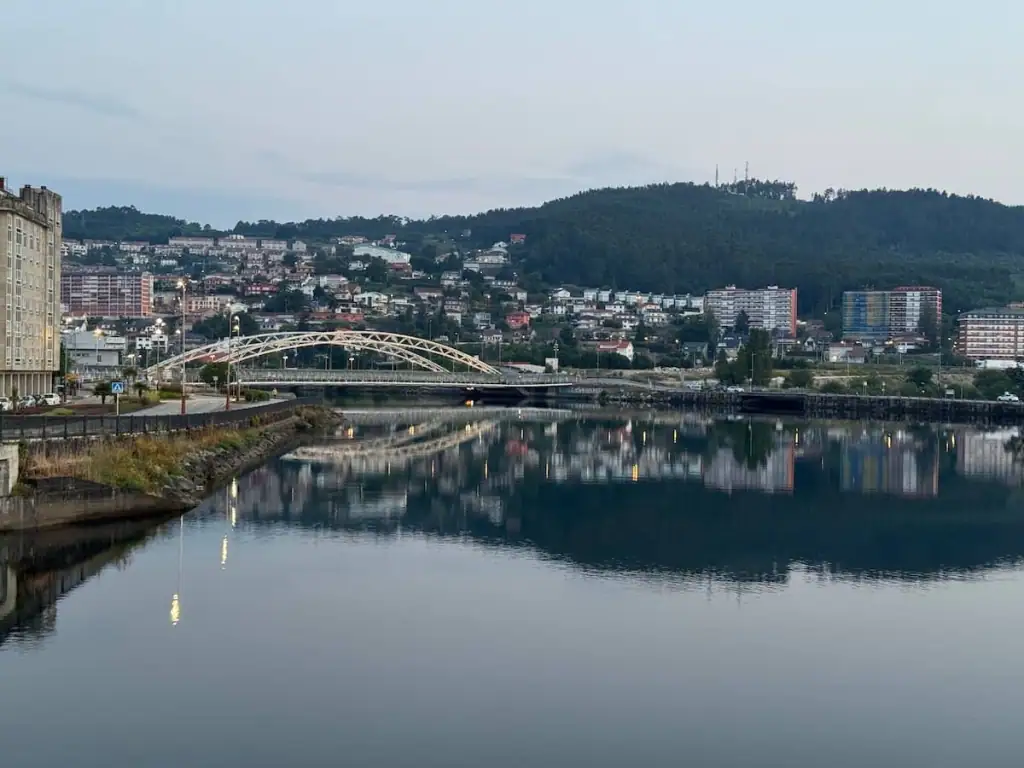
Conclusion: Visiting Pontevedra on the Camino de Santiago
From wandering the spectacular streets of the old town to visiting religious spaces and enjoying incredible food, Pontevedra has so much to offer for pilgrims. I highly recommend spending a night there using this guide to Pontevedra on the Camino so you can really enjoy this special stop!
Book Your Accommodation in Pontevedra, Spain
Book your accommodation in Pontevedra now so you don't have to stress about it beforehand and can make the most of your time in the city. Here are my recommended options:
📍Budget Option: Bulezen Urban Hostel
📍Mid-Range Option: Hostel Charino
📍Luxury Option: Parador Hotel
